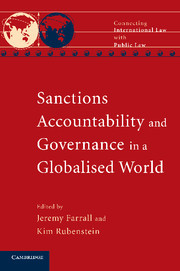Description
Sanctions, Accountability and Governance in a Globalised World
Connecting International Law with Public Law Series
Coordinators: Farrall Jeremy, Rubenstein Kim
First in a series examining connections between international and public law, discussing sanction implementation within the confines of domestic law.
Language: English
Subject for Sanctions, Accountability and Governance in a Globalised...:
Sanctions, Accountability and Governance in a Globalised World
Publication date: 02-2014
Support: Print on demand
Publication date: 02-2014
Support: Print on demand
Sanctions, Accountability and Governance in a Globalised World
Publication date: 11-2009
506 p. · 16.8x23.5 cm · Hardback
Publication date: 11-2009
506 p. · 16.8x23.5 cm · Hardback
Description
/li>Contents
/li>Biography
/li>
This book is the first in a series examining how public law and international law intersect in five thematic areas of global significance: sanctions, global health, environment, movement of people and security. Until recently, international and public law have mainly overlapped in discussions on how international law is implemented domestically. This series explores the complex interactions that occur when legal regimes intersect, merge or collide. Sanctions, Accountability and Governance in a Globalised World discusses legal principles which cross the international law/domestic public law divide. What tensions emerge from efforts to apply and enforce law across diverse jurisdictions? Can we ultimately only fill in or fall between the cracks or is there some greater potential for law in the engagement? This book provides insights into international, constitutional and administrative law, indicating the way these intersect, creating a valuable resource for students, academics and practitioners in the field.
Introduction: filling or falling between the cracks? Law's potential Jeremy Farrall and Kim Rubenstein; Part I. Setting Down the Foundations: 1. Whose public? Which law? Mapping the internal/external distinction in international law Peter G. Danchin; 2. The potential for a post-Westphalian convergence of 'Public Law' and 'Public International Law' Charles Sampford; Part II. Internationalising Public Law: 3. Globalisation and public law: a global administrative law? Simon Chesterman; 4. The deliberative deficit: transparency, access to information and UN sanctions Devika Hovell; 5. Who guards the guardian? Towards regulation of the UN security council's chapter VII powers through dialogue Hitoshi Nasu; 6. Holding the United Nations security council accountable for human rights violations through domestic and regional courts: a case of 'Be Careful What You Wish For'? Erika de Wet; Part III. Implementing Security Council Sanctions: 7. 'A Delicate Business': did AWB's kickbacks to Iraq under the United Nations Oil-For-Food Programme constitute a violation of Australia's international obligations? Kevin Boreham; 8. Should the United Nations security council leave it to the experts? The governance and accountability of UN sanctions monitoring Jeremy Farrall; Part IV. The Place of Corporations: 9. The nexus between human rights and business: defining the sphere of corporate responsibility Justine Nolan; 10. At the intersection of international and municipal law: the case of Commissioner Cole and the Wheat Export Authority Linda Botterill and Anne McNaughton; Part V. The Role of Lawyers: 11. International legal advisers and transnational corporations: untangling roles and responsibilities for sanctions compliance Stephen Tully; 12. What is the right thing to do? Reflections on the AWB scandal and legal ethics Vivien Holmes; Part VI. Public Law and Public Policy: 13. Who's responsible? Justiciability of private and political decisions Daniel Stewart; 14. AWB and oil for food: some issues of accountability Richard Mulgan; Part VII. Parallel Case Studies: 15. Discriminating for world peace Simon Rice; 16. Removing barriers to protection at the exported border: visas, carrier sanctions, and international obligation Angus Francis; Concluding remarks Thomas Pogge.
Jeremy Farrall is a Research Fellow at the Centre for International Governance and Justice, in the Regulatory Institutions Network at the Australian National University. He has worked extensively for the United Nations, serving in New York, Liberia and Cyprus. He is the author of United Nations Sanctions and the Rule of Law (Cambridge University Press, 2007) and co-editor of The Role of International Law in Rebuilding Societies after Conflict (Cambridge University Press, 2009).
Kim Rubenstein is Professor and Director of the Centre for International and Public Law (CIPL) in the ANU College of Law, Australian National University. Her research encompasses many projects in constitutional, administrative and citizenship law. Her previous publications include Australian Citizenship Law in Context (2002).
Kim Rubenstein is Professor and Director of the Centre for International and Public Law (CIPL) in the ANU College of Law, Australian National University. Her research encompasses many projects in constitutional, administrative and citizenship law. Her previous publications include Australian Citizenship Law in Context (2002).
© 2024 LAVOISIER S.A.S.




